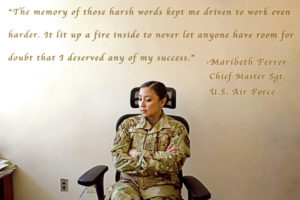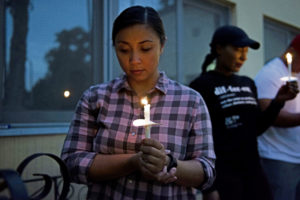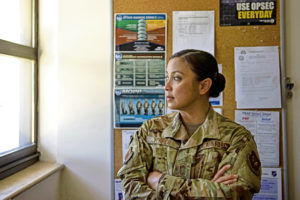INCIRLIK AIR BASE, Turkey — “Leadership, check on us… we’re not ok!”
An Airman posted this message on social media; a cry for help amidst a period of racial violence and social turmoil in America. U.S. troops stationed overseas could only watch as their nation reeled under one of the most divisive chapters in its history.
Chief Master Sgt. Maribeth Ferrer, 39th Medical Group superintendent, saw the Airman’s post and responded immediately, offering her contact information.

“My team and I are here to help,” she typed. “We’re here to listen; we’re here to act where needed. How can I help please? I am available any time today.”
Ferrer was no stranger to prejudice, having experienced it firsthand when she joined the Air Force in 1996 — only two years after immigrating to the U.S.
The chief hails from Bataan Province in the Philippines: the same region where thousands of American and Filipino troops paid the ultimate sacrifice in a ferocious battle against Japanese invaders during World War II.
“I grew up in a small town called Dinalupihan; we left for the U.S. when I was 16,” she said. “I was jokingly bragging to my dad that I wanted to be a military pilot and so he called my bluff. Next thing I knew, he got me an appointment to meet the Air Force recruiter. It was the best dare I ever took on! I’m not a pilot but I realized soon enough that my true calling was becoming a chief master sergeant.”
Ferrer remembered the first chapter of her military career as a sink or swim experience: learning two new cultures at once. She even recalled being mocked for her accent, being quickly dismissed and passed over for projects.
“It was definitely challenging and overwhelming,” Ferrer said. “Not only was I still adjusting to the American way of life; I also had to assimilate into the military culture. However, that challenge actually kept me on my toes to continually learn and adapt, which undoubtedly strengthened my resilience skills.”
Ironically, Ferrer perceived that this same prejudice also helped her promote earlier than most of her peers — when she faced the board for early promotion to senior airman. She asked her flight chief at the time what her chances were of being selected.
“His words forever etched in my brain,” Ferrer recalled. “He said, ‘Nah, don’t worry about it. You’ll get it: you’re female!’ He was right, I was selected. Sadly, his words made me doubt if my hard work and accomplishments had anything to do with it.”
From that day on, Ferrer found her resolve and decided no one will ever question her merit ever again.

“The memory of those harsh words kept me driven to work even harder,” Ferrer said. “It lit up a fire inside to never let anyone have room for doubt that I deserved any of my success.”
In retrospect, she credited this crucible as the fire which refined her into the leader she is today.
As Ferrer strived on, she still faced metaphorical giants as a woman of color. She mentioned how grateful she was to be assigned to a unit where there were other Airmen of Filipino ancestry. Although she wasn’t completely shielded from discrimination, she had friends she could lean on who understood her.
The years passed by, and Ferrer ascended through the ranks. Despite challenges she confronted as a minority serving in the military, the chief recalled that she also had very good experiences in her career.
“My favorite experiences in the military were during deployment and overseas tours,” Ferrer said. “Each time, I met remarkable people who are still dearest friends of mine to this day, even 10 or 15 years later. I truly enjoyed experiencing different cultures around the world. To me, it certainly helped enforce open-mindedness and develop my positive world view.”
She also noted that the Air Force made massive leaps in improving its culture, making it a safer and more welcoming organization for all Airmen. Ferrer gave credit to the Airmen who spoke up against discrimination, and also to leaders who listened and took action.
“It was because our Airmen did not allow their voices to be stifled by pain, anger or fear,” she said. “They kept pushing through those barriers until they were heard. Fortunately as well, there were leaders who were willing to listen — who genuinely cared. That combination created a safe and open environment for changes to occur.”
Ferrer has been selected to serve as the 39th Air Base Wing’s next command chief. She pointed out that although the Air Force has made immense improvements to its culture, it still has a long way to go in making all Airmen feel safe and welcome.
Incirlik Airmen look forward to seeing Ferrer take on her new post at Incirlik.

Staff Sgt. Maria Castillones, 39th Medical Operations Squadron non-commissioned officer in charge of Family Advocacy, recalled the time she first met Ferrer: at the dining facility shortly after arriving at Incirlik.
The encounter sparked mentorship.
“Chief Ferrer has mentored me during my entire time here at Incirlik, both personally and professionally,” said Castillones, who shares the chief’s Filipino-American heritage. “She is the kind of leader that has always found the time to visit sections and check in on us. She even holds an open forum with us regularly during her ‘Chief Chats.’”
Although Castillones lamented that she will have moved to her next duty station by the time Ferrer takes the helm, she remains confident in her mentor’s ability to lead Airmen.
Ferrer taught her to not just take care of herself, but also take care of her community. For this reason, Castillones believes Incirlik Airmen will be in good hands.
“She inspires people to keep pushing towards their goals,” Castillones recounted. “Chief has helped me find ways to reach out to and educate the population here at Incirlik in regards to domestic violence awareness, and has helped me become a better leader and grow as a mentor myself.”
As Ferrer packed up her office at the 39th MDG in preparation for her move to the wing, she reflected on her heritage. She remembered how her ancestors in the Philippines fought and died alongside Americans during the Battle of Bataan.
The future command chief remarked how she didn’t truly grasp that heritage until she moved to the U.S. and joined the Air Force.
“When I mention to people that I’m from Bataan, they say, ‘ah yes, we remember the Bataan Death March,” Ferrer mentioned, referring to the deadly trek undertaken by thousands of American and Filipino prisoners of war. “That’s when I realized I am from a region with a very rich history.”
For Ferrer, the epic struggle waged by the Allies during World War II illustrates that no matter what someone’s color, religion, ethnicity or cultural background is, all people share the same needs and desires in life.
This is why she emphasizes the necessity for everyone to cast off their prejudices and comprehend the reality that the only race is the human race.
“We all share that one blood,” Ferrer concluded. “At the end of the day, when your way of life as a human being is challenged, we all end up bonding together. It is very humbling knowing that whatever your background is, we are all reduced to that same basic fabric: we’re all people, and we all want to be treated equally.”


